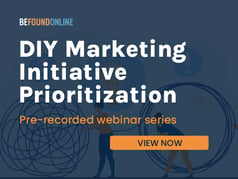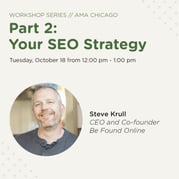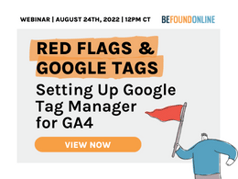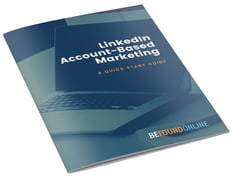
What is Link Juice?
Let’s talk about Link Juice. No, it’s not a gross energy drink; instead, it’s the equity or authority of a page that flows through hyperlinks, to your deep site pages, and eventually back out to other domains your site links to.
So, how do you use links responsibly to increase your site’s rankings and traffic?
The key word in the last sentence is responsibly. Inbound links matter. The anchor text of those links matters. The authority of those sites that the links come from matters. Whether or not you share the juice and how you do it matters.
Part of the algorithm that Google uses to determine the value of web content is the number of links that point to it from authoritative, trusted web domains and pages. A link to a page is a vote of confidence for the content that page contains, and the domain/subdomain that is hosting it.
Ever since webmasters began to appreciate the value of inbound links and the link juice that comes with them, some shadier webmasters or SEOs have sought ways to boost inbound links by gaming the system.
There are scores of people whom would like to find a shortcut to the top of the search engine results pages. Among the highly questionable shortcuts to gather link juice that people have tried are these:
- Link Rings or Link Wheels — A technique that involves linking multiple microsites — usually UGC sites with little oversight, such as Squidoo, Blogger, Tumblr, etc. — to one another with the final microsite linking back to the main domain. All these microsites funnel their juice down to the main domain.
- Blogrolls — This tactic usually involves hunting blogs with a similar subject matter to your own site (though this isn’t always the case), and requesting a link in that sidebar that typically includes a list of links to blogs that author appreciates. This isn’t technically black hat, but the tactic has been dramatically de-valued over the past year or so.
- Reciprocal Linking — “I’ll link to you if you link back to me!”
- Sponsored or Paid links — A sponsored or paid link is fine; heck, that’s how Google makes all their money — it’s called AdWords. The caveat is that you must, MUST indicate as such in a conspicuous location. If you are paying for links, you need to disclose that info to your viewers and Google.
I just need to throw up another disclaimer here. DO NOT DO THESE! Many of these are considered black hat, and perpetrating them will very likely cause Google to strike you down with great vengeance and furious anger. No, not really. In most cases it’s strictly algorithmic, but you can get penalized by a real Googler, so just don’t do it.
Are You Worthy?
So, how do you get good quality inbound links? It’s the Internet’s worst-kept secret. Think about the sites you link to. You link because there’s something worthy of directing visitors to. The not-so-secret secret of getting links is to create link-worthy content.
Not only should your content be link worthy, but it should also be engaging. Are your blog posts raising questions that spark debate in the community you serve? Are they insightful enough to get comments from other experts? Are you providing an answer to a question where none previously existed? Is your content good enough to break through the noise?
Not Just About You
Do you have the right amount of social interaction in your social media accounts so that you look like someone worth talking to, or who would even answer? You would be surprised at how many people or brands that ignore opportunities to engage with their followers. Do you engage your community on topics that go beyond the business of finding prospects and selling goods and services? No one wants to pull up a chair next to the guy that is pitching all the time.
Do you add value by contributing to other blogs, forums, and communities? Do you look for other experts who could bring something of value to your blog’s audience and invite them to guest blog? Do you offer insights on other blogs so that such invitations can come to you? If you have a hard time answering these questions, there’s a good chance you now have an idea of what to do next.
Share the Link Love
Are you generous with those you borrow from? Ever since “rel=nofollow” links, which allows you to plug up any juice that might flow to that link, webmasters can keep all of the juice to themselves. Sometimes nofollow may be the right course of action. For example, someone linking to www.google.com; Google’s doing just fine without your help. However, when you reference content created by someone else in your posts, why not give them a little link love? Share the juice. It feels good, and those on the receiving end of a followed link appreciate it. Even if they don’t, it’s good Karma, baby.
Mine Your Analytics for Content Insights
A close look at your analytics can tell you which author or type of content on your site is getting the most visitors. Use this data to craft future content. Where applicable, you can also look at comments on your blog posts for ideas for new content.
Tweak Your Failures
Look at the posts that are not so sticky. Why didn’t your content capture attention? Which keywords brought people to your site? Which keywords led people to bounce (exit the site without interacting with anything)? Could you provide something that meets a need and offers an opportunity to begin a dialogue? Make use of your analytics to tweak content that is not working for you, or your audience. Sometimes something as simple as re-titling a post to make it timely or adjusting the focus can make it link-worthy and sticky.
Want to learn more about SEO tactics to drive visitors to your site and put dollars in your pocket? Great! Give this ebook a read.

The BFO Team
Here at BFO, we're always striving to bring you the latest and greatest in digital marketing insights and education. We're not ones to brag, but we've been lucky enough to be featured in all sorts of fancy publications and media outlets, strutting our stuff and showing off our industry expertise.
CATEGORIES
SUBSCRIBE TO OUR BLOG
Stay up to date with the latest industry best practices in digital marketing!























.png?width=339&height=179&name=Webinar%20Banner%20(1).png)



.png?width=339&height=179&name=July%20Webinar%20(Newsletter).png)

.png?width=339&height=179&name=Webinar%20Banner-April-02%20(1).png)
%20(4).png?width=339&height=179&name=Webinar%20Banner-May-02%20(1)%20(4).png)




.png?width=339&height=179&name=March%202023%20Webinar%20Ad%20(autoresponder).png)









